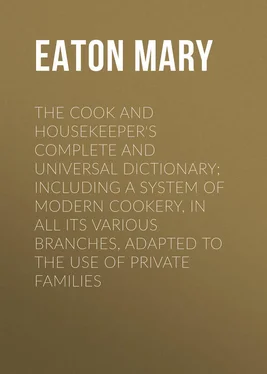1 ...8 9 10 12 13 14 ...47 ASSES' MILK, so beneficial in consumptive cases, should be milked into a glass that is kept warm, by being placed in a bason of hot water. The fixed air that it contains sometimes occasions pain in the stomach; at first therefore a tea-spoonful of rum may be taken with it, but should only be put in the moment it is to be swallowed. The genuine milk far surpasses any imitation of it that can be made; but a substitute may be found in the following composition. Boil a quart of water with a quart of new milk, an ounce of white sugar-candy, half an ounce of eringo-root, and half an ounce of conserve of roses, till the quantity be half wasted. As this is an astringent, the doses must be proportioned accordingly, and the mixture is wholesome only while it remains sweet. – Another way. Mix two spoonfuls of boiling water, two of milk, and an egg well beaten. Sweeten with white sugar-candy pounded: this may be taken twice or thrice a day. Or, boil two ounces of hartshorn-shavings, two ounces of pearl barley, two ounces of candied eringo-root, and one dozen of snails that have been bruised, in two quarts of water till reduced to one. Mix with an equal quantity of new milk, when taken, twice a day.
ASTHMA. As this complaint generally attacks aged people, the best mode of relief will be to attend carefully to diet and exercise, which should be light and easy, and to avoid as much as possible an exposure to cold and frosty air. The temperature of the apartment should be equalised to moderate summer's heat by flues and stoves, and frequently ventilated. A dish of the best coffee, newly ground and made very strong, and taken frequently without milk or sugar, has been found highly beneficial. An excellent diet drink may be made of toast and water, with the addition of a little vinegar, or a few grains of nitre. Tar water is strongly recommended, and also the smoking of the dried leaves of stramonium, commonly called the thorn-apple.
ASTRINGENT BOLUS, proper to be taken in female complaints, arising from excessive evacuations. Fifteen grains of powdered alum, and five grains of gum kino, made into a bolus with a little syrup, and given every four or five hours till the discharge abates.
ASTRINGENT MIXTURE, in case of dysentery, may be made of three ounces of cinnamon water, mixed with as much common water, an ounce and a half of spirituous cinnamon-water, and half an ounce of japonic confection. A spoonful or two of this mixture may be taken every four hours, after the necessary evacuations have been allowed, and where the dysentery has not been of long standing, interposing every second or third day a dose of rhubarb.
Bacon, though intended to be a cheap article of housekeeping, is often, through mismanagement, rendered one of the most expensive. Generally twice as much is dressed as need be, and of course there is a deal of waste. When sent to table as an accompaniment to boiled poultry or veal, a pound and a half is plenty for a dozen people. Bacon will boil better, and swell more freely, if the rind is taken off before it is dressed; and when excessively salt, it should be soaked an hour or two in warm water. If the bacon be dried, pare off the rusty and smoked part, trim it neatly on the under side, and scrape the rind as clean as possible. Or take it up when sufficiently boiled, scrape the under side, and cut off the rind: grate a crust of bread over it, and place it a few minutes before the fire to brown. Two pounds will require to be boiled gently about an hour and a half, according to its thickness: the hock or gammon being very thick, will take more. See Dried Bacon.
BAKING. This mode of preparing a dinner is undoubtedly one of the cheapest and most convenient, especially for a small family; and the oven is almost the only kitchen which the poor man possesses. Much however depends on the care and ability of the baker: in the country especially, where the baking of dinners is not always considered as a regular article of business, it is rather a hazardous experiment to send a valuable joint to the oven; and more is often wasted and spoiled by the heedless conduct of the parish cook, than would have paid for the boiling or roasting at home. But supposing the oven to be managed with care and judgment, there are many joints which may be baked to great advantage, and will be found but little inferior to roasting. Particularly, legs and loins of pork, legs of mutton, fillets of veal, and other joints, if the meat be fat and good, will be eaten with great satisfaction, when they come from the oven. A sucking pig is also well adapted to the purpose, and is equal to a roasted one, if properly managed. When sent to the baker, it should have its ears and tail covered with buttered paper fastened on, and a bit of butter tied up in a piece of linen to baste the back with, otherwise it will be apt to blister. A goose should be prepared the same as for roasting, placing it on a stand, and taking care to turn it when it is half done. A duck the same. If a buttock of beef is to be baked, it should be well washed, after it has been in salt about a week, and put into a brown earthen pan with a pint of water. Cover the pan tight over with two or three thicknesses of writing paper, and give it four or five hours in a moderate oven. Brown paper should never be used with baked dishes; the pitch and tar which it contains will give the meat a smoky bad taste. Previously to baking a ham, soak it in water an hour, take it out and wipe it, and make a crust sufficient to cover it all over; and if done in a moderate oven, it will cut fuller of gravy, and be of a finer flavour, than a boiled one. Small cod-fish, haddock, and mackarel will bake well, with a dust of flour and some bits of butter put on them. Large eels should be stuffed. Herrings and sprats are to be baked in a brown pan, with vinegar and a little spice, and tied over with paper. These and various other articles may be baked so as to give full satisfaction, if the oven be under judicious management.
BAKED CARP. Clean a large carp, put in a Portuguese stuffing, and sow it up. Brush it all over with the yolk of an egg, throw on plenty of crumbs, and drop on oiled butter to baste with. Place the carp in a deep earthen dish, with a pint of stock, a few sliced onions, some bay leaves, a bunch of herbs, such as basil, thyme, parsley, and both sorts of marjoram; half a pint of port wine, and six anchovies. Cover over the pan, and bake it an hour. Let it be done before it is wanted. Pour the liquor from it, and keep the fish hot while you heat up the liquor with a good piece of butter rolled in flour, a tea-spoonful of mustard, a little cayenne, and a spoonful of soy. Serve it on the dish, garnished with lemon and parsley, and horse-radish, and put the gravy into the sauce tureen.
BAKED CUSTARD. Boil a pint of cream and half a pint of milk with a little mace, cinnamon and lemon peel. When cold, mix the yolks of three eggs, and sweeten the custard. Make the cups or paste nearly full, and bake them ten minutes.
BAKED HERRINGS. Wash and drain, without wiping them; and when drawn, they should not be opened. Season with allspice in fine powder, salt, and a few whole cloves. Lay them in a pan with plenty of black pepper, an onion, and a few bay leaves. Add half vinegar and half small beer, enough to cover them. Put paper over the pan, and bake in a slow oven. If it be wished to make them look red, throw a little saltpetre over them the night before.
BAKED MILK. A very useful article may be made for weakly and consumptive persons in the following manner. Put a gallon of milk into a jar, tie white paper over it, and let it stand all night in the oven when baking is over. Next morning it will be as thick as cream, and may be drank two or three times a day.
BAKED PEARS. Those least fit to eat raw, are often the best for baking. Do not pare them, but wipe and lay them on tin plates, and bake them in a slow oven. When done enough to bear it, flatten them with a silver spoon; and when done through, put them on a dish. They should be baked three or four times, and very gently.
Читать дальше












![John Bruce - The Lettsomian Lectures on Diseases and Disorders of the Heart and Arteries in Middle and Advanced Life [1900-1901]](/books/749387/john-bruce-the-lettsomian-lectures-on-diseases-and-disorders-of-the-heart-and-arteries-in-middle-and-advanced-life-1900-1901-thumb.webp)